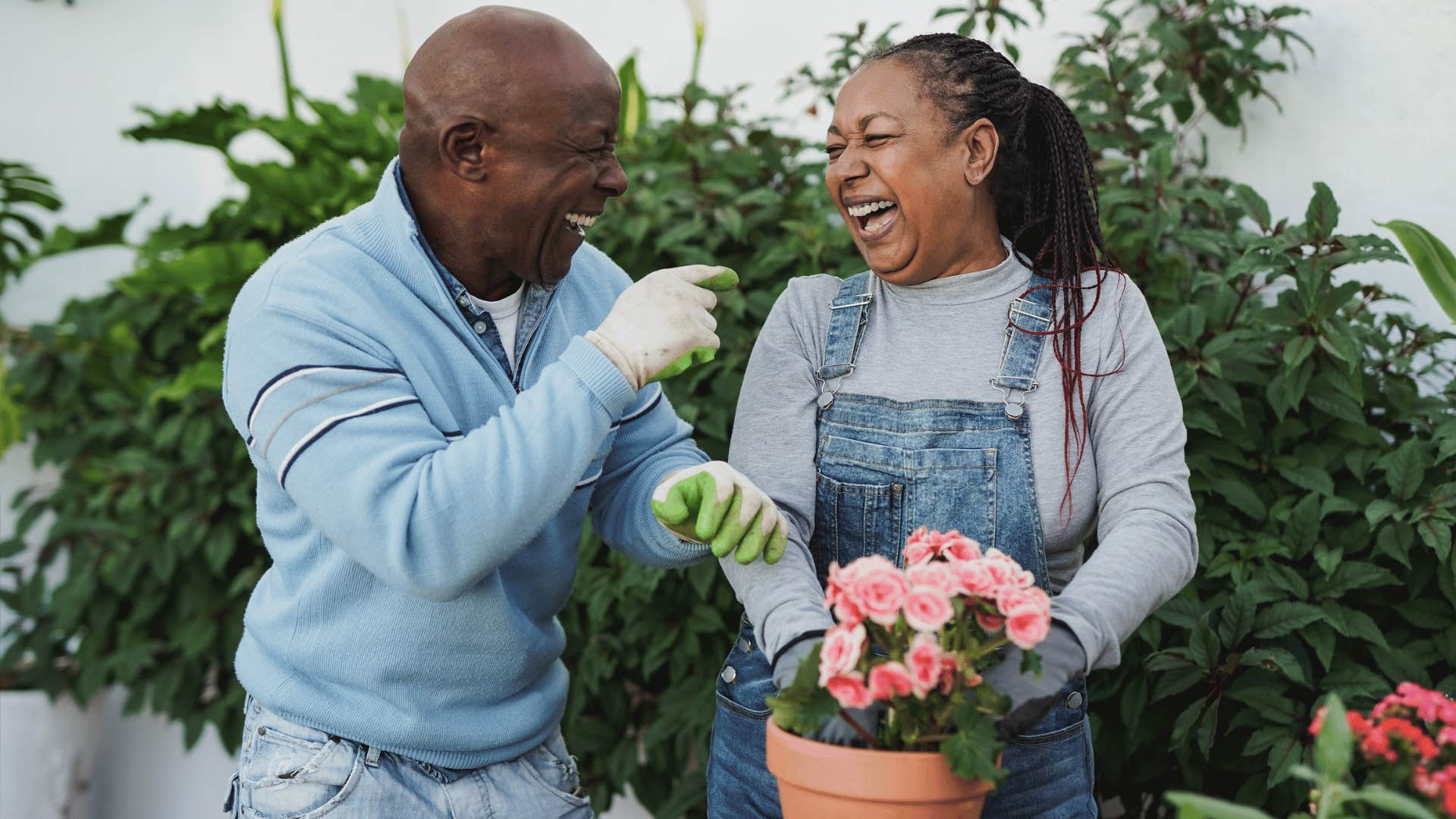6 Boomer Habits People Make Fun Of That Experts Say Are Actually Good For Your Marriage
There are reasons many Baby Boomer marriages have survived the test of time.
 shurkin_son | Shutterstock
shurkin_son | Shutterstock Baby Boomers tend to be seen as out of step or silly in their ideals. Of course, this is an example of ageism and doesn't help move our conversations or relationships forward in a productive way. The Boomer marriage that has lasted over the decades is a particularly special occurrence we all can take notes.
The long-lasting Baby Boomer marriage has stood the test of time, social change, personal differences, and who knows how many disagreements between the partners. So, there must be something to learn from their habits.
Here are Baby Boomber habits people make fun of that experts say are good for your marriage:
1. They know the power of interacting face-to-face
 PeopleImages.com - Yuri A via Shutterstock
PeopleImages.com - Yuri A via Shutterstock
Divorce mediator Jennifer S. Hargrave has been between many arguing spouses and has seen how.
"A boomer habit that makes for better marriages is actual face-to-face communication, and spending time together talking. While we may make fun of Boomers for not being as tech-savvy as the younger generations, they also are not caught up doom scrolling while sitting next to their partner."
Research from The Social Science Computer Review found that reduced relationship satisfaction and increased conflicts can influence doomscrolling behavior, but making sacrifices for the relationship partner positively affected relationship satisfaction and reduced conflicts.
The study concluded that excessive social media use may harm relationships and personal well-being, but being willing to sacrifice can reduce the problem.
2. They pick up the phone to call and speak directly
 Branislav Nenin via Shutterstock
Branislav Nenin via Shutterstock
As a couples counselor, Siddharth S. Kumaar has discovered from his older clients that, "In a marriage, direct phone contact has various advantages to texting most of which cannot be replicated.
By properly expressing tone and emotion, it helps to avoid misinterpretation and thereby lessens misunderstandings. Making the effort to contact shows your spouse they are a top concern and reflects intentionality.
Kumaar elaborates on the power of hearing your spouse's voice, "Hearing each other's voices creates emotional closeness, therefore increasing the link between spouses, as supported by research from The American Psychological Association (APA).
Phone calls also inspire active listening, therefore fostering more knowledge and meaningful dialogues. They also help to rapidly and sympathetically resolve problems, unlike protracted text conversations"
3. They give handwritten notes of gratitude
 AYO Production via Shutterstock
AYO Production via Shutterstock
"When the norm for communication has been reduced to emails, texting, or a social media post, perhaps one of the most endearing habits that still warms the heart and ensures closeness is a handwritten expression of gratitude, appreciation, or significance," says marriage educator Larry Michel.
Michel continues with examples, "From a sticky pad note left on a mirror to a sweet card in an envelope left on a counter or sitting next to a single stem flower leaves the mark of a delicious surprise that is rarely if ever forgotten."
4. They eat dinner together — without their phones
 Yakobchuk Viacheslav vis Shutterstock
Yakobchuk Viacheslav vis Shutterstock
Therapist Gloria Brame knows the importance of a dedicated meal time, "When I was growing up, my parents served a balanced dinner promptly at 6 pm. There were no devices to distract us from the meal. That meant we had to talk to each other for entertainment."
"These days, couples are distracted by their jobs, friends, and devices, have fewer conversations at the table (if they even sit at a dinner table), and often rely on fast-food delivery or snacks to feel full."
A study from the APA found casual interactions between partners were a contributing factor to relationship satisfaction, as was, more importantly, adherence to rules of social interaction between the couple.
According to Brame, "Dinner time doesn't have to be rigid, but the health of a marriage should make time for conversation every night, before you're sleepy or get caught up in a TV binge.
It's also better for personal health to have a nutritious meal two to three hours before bedtime every night."
5. They understand the importance of delayed gratification
 Sabrina Bracher via Shutterstock
Sabrina Bracher via Shutterstock
When action is often the name of the game, relationship coach Michelle E Vasquez has heard, "I want it in 30 seconds, and I want it hot, tasty, and inexpensive. Since the advent of fast food, we seem to have become an instant gratification society."
One study published in Frontiers in Psychology indicates that instant gratification has made people more impulsive in their decision-making. Some people complain about their marriage if everything is not perfect and to their liking.
"They think of their marriage as fast food, not fine dining. It becomes a disposable commodity instead of something to treasure and enjoy."
6. They know when you marry someone, you marry their family and friends, too
 Only_NewPhoto via Shutterstock
Only_NewPhoto via Shutterstock
"Yes, your partner will become your immediate family. That means that you and your partner need to prioritize each other above everyone else — at least, till you have kids, if you have kids," explains author Ossiana Tepfenhart when she discusses how her parents modeled a great marriage.
"If your partner’s family keeps trying to push you to the bottom of the ladder, your relationship is doomed from the beginning. If your partner’s family and friends hate you, then trying to marry your partner will result in a horrible future for yourself," Tepfenhart learned from her Boomer parents.
She concludes with, "Take time to meet and bond with the people your partner surrounds themselves with. Do they treat you well? Do you feel welcome and cared for when you’re with them? That’s a great sign."
Boomers know how to take time, focus, and produce positive results when they have the energy of love driving their actions.
The long-lasting Baby Boomer marriage is exceptional in many ways, the least of which is the fact the relationship has survived into the 21st century and beyond, which is probably enough to make the rest of the generations perk their heads up and take notes. Hand-written notes, preferably.
Will Curtis is a creator, editor, and activist who has spent the last decade working remotely.

